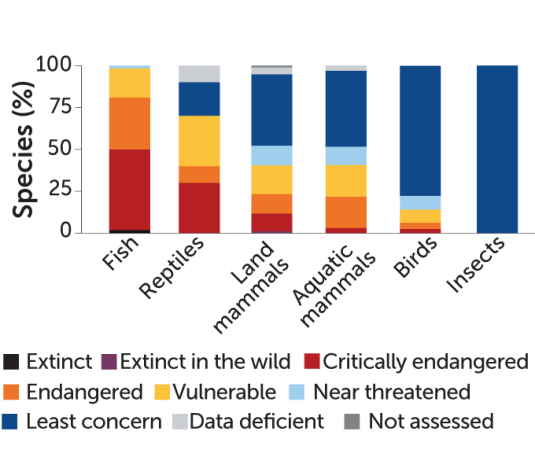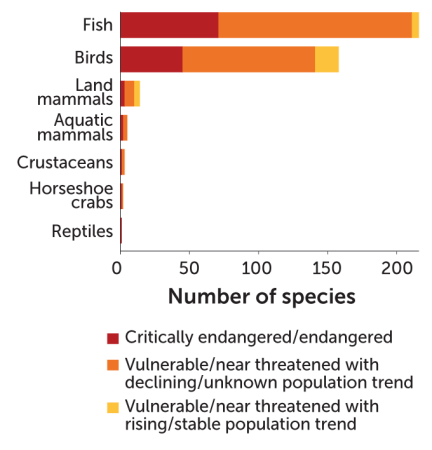This post was originally published on this site
Migratory species don’t travel with a passport, but they cross borders all the time. This makes the animals’ conservation a uniquely challenging, international effort.
That effort needs a lot of work, researchers argue in the first-ever “State of the World’s Migratory Species” report published February 12 by the United Nations Environment Programme.
The report is the most comprehensive tally of the over 1,000 species protected under an international treaty called the Convention on the Conservation of Migratory Species of Wild Animals, or CMS. Nearly half of CMS species are experiencing population declines. Of those, fishes are faring the worst: 97 percent, roughly 56 species, are facing extinction. That includes species such as devil rays (Mobula mobular) and scalloped hammerheads (Sphyrna lewini).
“It’s that real decline in fish species that … is keeping me up at night,” said Kelly Malsch of UNEP’s World Conservation Monitoring Centre at a February 8 news conference.
The goal of the report is to guide priorities for CMS COP14, a meeting of global conservation leaders starting February 12 in Samarkand, Uzbekistan, to create new strategies for the protection of migratory species. This includes mammals, birds, reptiles, amphibians and insects. These groups overall are faring better than fishes, but the report still shows that 1 in 5 of all the species covered by the treaty is at risk of extinction. While much of the data in the report is alarming, success stories like the recovery of humpback whales may provide ideas for protection of other species, including fishes (SN: 11/18/19).
U.N. researchers reviewed data from the International Union for Conservation of Nature Red List of Threatened Species and found a 90 percent average decrease in the abundance of CMS-listed fishes since 1970. No other group of animals experienced an average decrease, let alone one this significant. The main culprits include bycatch (the accidental catching of fish), overfishing and pollution, the report notes.
The report goes beyond the species of every group already under the treaty’s protection and identifies almost 400 other species as vulnerable, including more than 200 fish species that are not yet protected — most of which have decreasing populations, like the zebra shark (Stegostoma tigrinum).
“When you drill down into it, very few fish species are actually protected,” says Richard Caddell, an expert in marine and environmental law and policy at Cardiff University in Wales, who was not a part of this report. Only a few, like those heralded for caviar, are better protected than the rest, mainly for their commercial value.
Protecting migratory species on land across multiple countries is hard enough. But when it comes to animals in water, it’s a whole other beast. Most of the ocean is a mystery, and new environments are still being discovered, making conservation efforts harder (SN: 4/30/23).
And fish have another problem — they’re not sexy, Caddell says. Fish don’t draw conservation funding and international recognition the way gorillas and elephants and other charismatic megafauna do. “People think of a fish as being something that ends up on their plates,” he says.
This report might help to change that.
It recommends ways to protect migratory fish species from pollution and bycatch, like attaching LED lights to nets to deter certain fish. But it also keeps fishes in the spotlight, weaving the discussion of them throughout the report. By making their decline central to this report, delegates at CMS COP14 may take more notice, Caddell says.
“States not acting might not be [failing to protect fish species] out of malice or negligence, but out of sheer ignorance as to the true conservation status of a number of these animals, which is why a report like this is brilliant,” Caddell says.
More than 100 parties have signed and ratified the CMS since 1979. The United States is not one of those countries, but it has agreed to elements of the treaty focusing on marine mammals and sharks. But even for nations that have ratified the CMS, there’s no real legal penalties if they don’t follow the treaty. Instead, Caddell says reports like this new one remind those involved to do better.
“I think this report is a very, very welcome development,” Caddell says. “There’s an opportunity here to build a little bit of political momentum to try to think about fish in a different way. And to move away from that we’re just there to eat them.”


